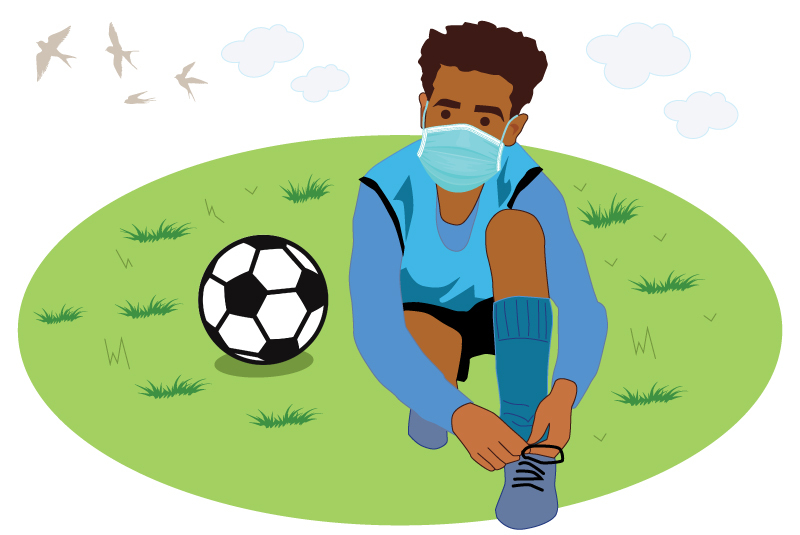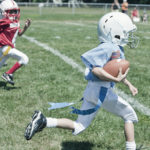Could returning to sports after COVID-19 harm kids’ mental health?

After a year away from playing, athletes everywhere are excited to jump back into the sports they love. And for the most part, participating in sports is great for kids’ mental health. Yet for some, the demands of training and competition can cause stress and anxiety. While their teammates celebrate their return to play, some athletes may be struggling with feelings of dread.
When does sports participation cross a line and become harmful for mental health? And how can parents, coaches, and athletes protect kids’ minds as well as their bodies?
Sports and stress: Why some athletes burn out
As ironic as it may sound, identifying too closely with sports can put an athletes’ mental health at risk says Dr. Michael Beasley, a physician in the Sports Medicine Division. “When a kid’s identity is completely wrapped up in their sport, they don’t have anything to fall back on when something goes wrong.” The repercussions of a bad game or an injury can devastate a kid who believes their worth comes from being an athlete.
Signs an athlete may need help
Parents, if you notice any of these signs of a possible mental health issue, check in with your child. Ask how they’re feeling and consider seeking professional support.
- isolation
- loss of joy in the game
- anxiety
- moodiness
- significant changes in weight
Such over-identification has increased in recent years as more kids have specialized in a single sport, leaving little time for anything else. “Kids used to play different sports in different seasons but now there’s this pressure to specialize in the same sport all year.”
The time – and in many cases, money – devoted to playing one sport year-round tends to shift the focus from camaraderie and skill development to winning at all costs. “Kids burn out when the outcome: having the highest score or the lowest time, is the most important thing,” says Kimberly O’Brien, clinical social worker with the Sports Medicine Division. “If they’re worried about that at every practice, they’re going to play out of fear.”
A different way of looking at sports stress
Nonetheless, O’Brien says, not all stress is bad for kids. Learning how to handle pressure in manageable amounts is an important life skill. “Sports can be a great opportunity to teach kids about psychological resilience and bouncing back from adversity.”
Being able to reach within and move forward in the face of unwanted events and emotions is a great skill kids can learn from sports.”
Kimberly O’Brien
Sports are a chance for kids to set goals and work to achieve them. The hours of practice may not be fun, but seeing hard work pay off offers its own rewards. “Success comes from the ability to persevere,” says O’Brien. “Being able to reach within and move forward in the face of unwanted events and emotions is a great skill kids can learn from sports.”
In other words, losing can be surprisingly valuable. It is a chance to reflect on why the other team won and how to keep forging ahead – and that is a part of life. Self-awareness and learning how to accept feedback without feeling criticized serves people of all ages well, in many facets of life.
Managing the stress of returning to sports after a year of COVID-19
As kids ease back into sports, O’Brien and Beasley have seen signs of rising anxiety in many of the athletes they work with. These feelings are natural, says O’Brien. “It’s key that coaches and parents understand what their athletes are going through. But feelings of anxiety don’t necessarily mean a kid doesn’t want to play.”
For the sake of athletes’ physical and emotional health, it will be wise to take things slow as kids return to sports and competition. Expecting to play at a high level without time for physical conditioning is a recipe for injury – and yet more time away from sports.
I strongly recommend focusing on the fundamentals, developing skills, rebuilding strength and conditioning, so athletes can return safely to activities they love.”
Dr. Michael Beasley
“Coaches, parents, and athletes need to have an open conversation about goals this season,” says Beasley. To manage the stress of returning to play and prevent a rash of injuries, he advises setting expectations differently than usual. “I strongly recommend focusing on the fundamentals, developing skills, rebuilding strength and conditioning, so athletes can return safely to activities they love.”
Mental strategies for athletes returning to sports after a year of COVID-19
- Set expectations – Don’t expect yourself to pick up where you left off last year. Give yourself time to rebuild your technique, strength, and confidence.
- Focus on what you can control – Comparing yourself to others could undermine your comeback. Focus instead on what you can control, such as setting an intention for every practice or working on a specific skill.
- Be in the moment – Directing your energy toward being the best athlete you can be – not the whether you win or lose – can help you experience joy rather than fear.
- Practice self-compassion – Talk to yourself like you would a good friend. Stick with positive self-talk such as, “It’s alright. You’ll get this. Keep pushing through.”
Learn more about Boston Children’s response to COVID-19 and the Sports Medicine Division.
Related Posts :
-

Organized sports and COVID-19: Are we there yet?
After a long, challenging year, many student athletes have returned to play this spring with joy and relief. But, organized ...
-

Ask a sports medicine specialist: Why are ACL tears so common among female athletes?
When an athlete is sprinting after an opponent who suddenly stops or changes direction, their anterior cruciate ligaments (ACLs) make ...
-

Forging a path back to school after orthopedic trauma
Orthopedic trauma can force children to miss school, sometimes for an extended period. But even when patients have regained enough ...
-

Jackie’s dreams of playing professional soccer back on track after ACL surgery
From her dorm in Newcastle, England, Jackie Zapata can hear fans roaring in the soccer stadium a few blocks away. ...





